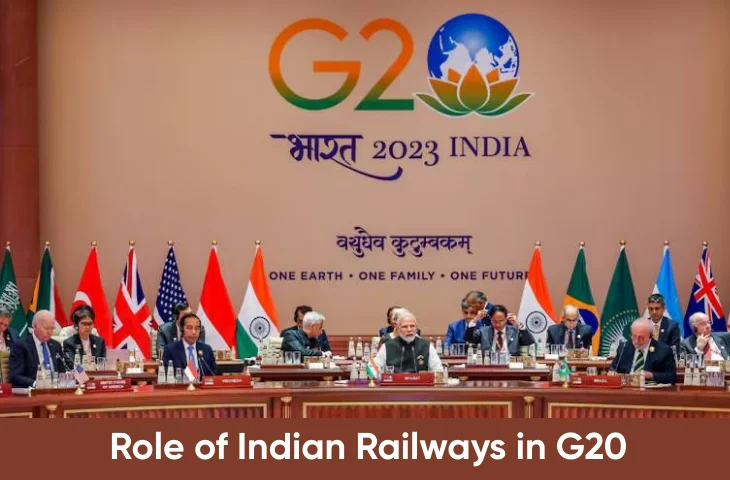The Indian Railways in G20 discussions highlighted the importance of sustainable transport, green energy, and global connectivity. As one of the world’s largest railway networks, Indian Railways has not only transformed domestic mobility but also contributed to global dialogues on climate, infrastructure, and economic growth. Its role in G20 and other international events reflects India’s commitment to cleaner, faster, and more inclusive transport solutions.
Why Indian Railways Matters Globally?
Indian Railways matters globally as it helps in carrying millions of passengers daily and moving huge volumes of freight, which represents efficiency, inclusivity, and affordability. With global challenges like climate change and sustainable development gaining attention, the presence of Indian Railways in G20 forums underscores its strategic role in shaping future transport policies.
Indian Railways in G20: A Platform for Global Leadership
The G20 brings together the world’s largest economies to address global issues. For India, railways act as a model of balancing development with sustainability.
- Railways are central to India’s climate commitments under the Paris Agreement.
- Indian Railways showcased its net-zero carbon emission by 2030 mission.
- Discussions emphasized affordable, accessible, and clean transport for emerging economies.
Showcasing Indian Railways During G20 Presidency
India’s G20 presidency in 2023 provided a unique opportunity to present the progress of Indian Railways. Some of the details are given below:
| Theme | Key Highlights |
| Green Energy & Electrification | Indian Railways targets 100% electrified broad-gauge routes by 2030. Showcased renewable energy projects including solar and wind power. |
| Modernization & Passenger Comfort | Vande Bharat Express or the Bullet Train Project in India highlighted as a success in indigenous semi-high-speed technology. Advances in digital ticketing, station upgrades, and modern passenger amenities attracted global interest. |
| Freight Corridors & Logistics | Dedicated Freight Corridors (DFCs) demonstrated improved efficiency in goods transport. Emphasis on reducing logistics costs and boosting domestic & international trade. |
Role of Indian Railways in International Events Beyond G20
While the G20 provides a global stage, Indian Railways has also played a role in other international forums. These are as follows:
| Theme | Key Highlights |
| Climate Summits (COP Conferences) | Indian Railways showcased its climate strategies on global platforms. Commitment to becoming a net zero emitter by 2030 earned global appreciation. |
| International Exhibitions & Trade Fairs | Displayed innovations like bio-toilets, automatic ticketing, and solar-powered trains. Participation in technology summits encouraged collaborations with global railway companies. |
| Regional Cooperation Platforms | Active role in SAARC and BIMSTEC discussions on cross-border rail connectivity. International recognition for projects like India–Bangladesh and India–Nepal rail links. |
Contribution to Global Goals
Indian Railways aligns with several international goals, making it relevant in G20 and beyond. The major contributions to global goals include:
- Supports SDG 7 (Affordable and Clean Energy) through electrification and renewables.
- Contributes to SDG 9 (Industry, Innovation, and Infrastructure) by expanding freight corridors.
- Encourages SDG 13 (Climate Action) by reducing carbon emissions.
Challenges Faced by Indian Railways on the Global Stage
Despite its achievements, Indian Railways faces hurdles in meeting international benchmarks. The major challenges are:
- Funding large-scale modernization projects.
- Balancing affordability with high-end technological upgrades.
- Integrating digital innovations at the speed of developed nations.
However, participation in the G20 has opened doors for global partnerships, funding support, and technology transfers.
Summary Section of Indian Railways in G20
We have provided some key points summarizing the Indian Railways in G20. Check out the details below:
- Indian Railways in G20 emphasized sustainability, affordability, and inclusivity in global transport.
- Showcased electrification, renewable energy, and modernization through Vande Bharat trains and DFCs.
- Contributes actively to climate forums, SDGs, and regional cooperation platforms.
- Challenges include funding, rapid modernization, and balancing growth with affordability.
- Acts as a model for developing nations striving for green and inclusive transport.
The participation of Indian Railways in G20 reflects more than just national pride; it demonstrates India’s commitment to building a sustainable, inclusive, and globally competitive railway system. From electrification drives to showcasing indigenous trains like Vande Bharat, Indian Railways has positioned itself as a leader among emerging economies. Its contribution to international events highlights how a national transport system can play a transformative role in achieving global climate goals, economic growth, and sustainable mobility.
Also Read:
- A Look into the Indian Railway Board and Its Functions
- Know about the Digitization of Indian Railway Services
- Railways Contribution to Indian GDP
- Cost of Railway Projects and Subsidies
FAQs
The Indian Railways in G20 discussions highlighted the importance of sustainable transport, green energy, and global connectivity.
Indian Railways matters globally as it helps in carrying millions of passengers daily and moving huge volumes of freight, which represents efficiency, inclusivity, and affordability.
The key highlights were:
Indian Railways targets 100% electrified broad-gauge routes by 2030.
Showcased renewable energy projects, including solar and wind power.
The major challenges faced by Indian Railways are as follows:
Funding large-scale modernization projects.
Balancing affordability with high-end technological upgrades.
Integrating digital innovations at the speed of developed nations.
Some of the ways in which Indian Railways contribute to global goals are as follows:
Supports SDG 7 (Affordable and Clean Energy) through electrification and renewables.
Contributes to SDG 9 (Industry, Innovation, and Infrastructure) by expanding freight corridors.

Hello! This is Arijit Dutta. I am a skilled Content Writer at Oliveboard with nearly 3+ years of experience in crafting engaging, informative, and exam-focused content for the Railways Domain. With a strong command of language and a keen understanding of learner needs, I contribute significantly to Oliveboard’s mission of delivering high-quality educational resources. Passionate about clear communication and continuous learning, I consistently create content that helps government job aspirants achieve their goals. Outside of work, I enjoy playing cricket and listening to music, which helps me stay balanced and creative in my professional journey.
